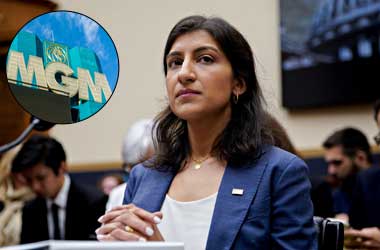 Summary:
Summary:
- The lawsuit claims the FTC violated the company’s 5th Amendment rights.
- The investigation took place in September 2023.
- MGM says the FTC did not follow conflict-of-interest guidelines.
MGM Resorts International is unhappy with how the Federal Trade Commission handled the investigation into a cyberattack in 2023.
The casino company has filed a lawsuit with four counts against the FTC and its Chairwoman, Lina M. Khan (pictured). Based on the investigation tactics in September 2023, the claim states that the agency violated the Fifth Amendment regarding the right to due process.
FTC Guideline Breach
MGM’s lawsuit alleges that the FTC, in its handling of the cyberattack investigation, failed to adhere to its own guidelines regarding conflict-of-interest regulations. This legal action, filed in the United States District for the District of Columbia, looks to halt the FTC’s civil investigative demand. MGM is hopeful that this demand will only be met if Chairwoman Khan recuses from the situation, potentially influencing the FTC’s future actions.
A civil investigative demand is one in which the federal agency has the right to request a large amount of data from a private company without having to complete court proceedings.
The lawsuit states that
the Due Process Clause of the Fifth Amendment allows parties subject to government action to have a fair hearing in front of an impartial tribunal. The said parties should also be subject to equal treatment under the law.
MGM has taken this legal action to safeguard its rights and challenge the actions of the FTC and its Chair. This move underscores MGM’s unwavering commitment to protect the interests of its stakeholders.
Conflict of Interest
In the lawsuit, it is alleged that Khan and a senior aide are in a conflict of interest because they were staying at the MGM Grand on September 12 when the attack took place. Khan and the aide were front and center after the attack, questioning the company’s procedures for handling the cyberattack.
The company lost around $100 million due to the cyberattack, which shut down services for several days. MGM claims that Khan’s public disclosure of her experience resulted in 15 consumer class-action filings against the company. MGM would like to see Khan removed from the investigation because she could have been a witness in legal actions against the company since she was there.
MGM has also requested that the court find the FTS’s rules on recusal as unconstitutional. They want the court to rule that the company is not a financial institution and should not be held to the FTC rules regarding identity theft and customer information safety.
The FTC says MGM is subject to such rules since the company provides high-rolling players with markers. A marker is a percentage of play, with gambling companies saying it equals a gambler paying a tab and not using credit.
MGM feels that much of the information that the FTC wants is now relevant to the cyberattack. It is now up to the court to decide how the process will continue. Will the FTC be given full access to information, or will MGM be able to send fewer details and see the investigation come to an end faster than expected?

